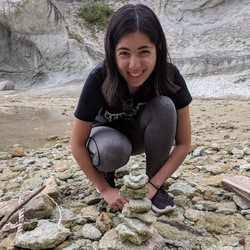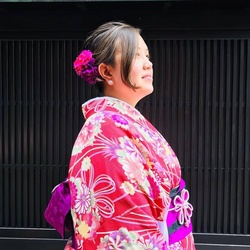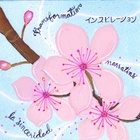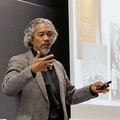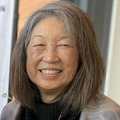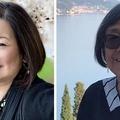Happy spring everyone! This month, we’re excited to feature two poets who both happen to be based in Japan. Micah Tasaka, a queer, genderfluid, mixed race Yonsei artist originally from the Inland Empire now based in Fukui prefecture; and Yoshika Wason, a second generation, mixed race artist who hails from Aomori, Japan via Massachusetts and Connecticut. Their pieces here harken back and forth from past circumstance to present choice, in reflection of the way our memories, our native tongues, our very existence, was and continues to be shaped. Enjoy.
—traci kato-kiriyama
* * * * *
Yoshika Wason is a teacher, poet, and storyteller. She is a mixed race Japanese American Nisei who has called Connecticut, Massachusetts, and now Aomori, Japan home. She holds a BA in English and secondary education from Boston College, where she was editor-in-chief of ASIAM, an Asian Pacific Islander American literary magazine. As a JET Programme participant, she is currently co-president of the Asian Pacific Islander Association for Japan Exchange and Teaching (API AJET).
Family History
“Do what you are going to do, and I will tell about it”
From “I Go Back to May 1937” by Sharon Olds
i.
When my mom was growing up in Saitama
she was a tomboy who liked competitive sports.
she would challenge her friends to play
tennis and ping pong—and would always win.
her friends nicknamed her “Skeleton”
when they learned that word in English class
and compared it to her lean athletic body.
I wish I got to meet this version of my mom
because I’ve never know her to like sports.
ii.
When my dad was growing up in Wisconsin
he had never seen the ocean and had only
been to two states. What he knew was sitting
between his parents in a pickup truck,
inhaling a cloud of their cigarette smoke
as they argued about bills and kids.
While my dad took it all in, I imagine that
he dreamed up his own future family,
one that wasn’t complicated by divorce.
iii.
When my parents met in New York City
they both knew they were ready to get married
but neither one knew just who they would marry.
They left that decision to a man who matched couples
by pointing at them one by one, drawing
from a crowded room full of eager men and women.
Meaning was assigned to these new couples:
proof of their commitment to the movement,
an active step toward world peace,
and the promise of sinless children.
They thought it a blessing to be in that room.
After years of being told he was too young,
my dad was relieved to finally have a wife.
And my mom couldn’t stop herself from thinking
that her new husband looked like Tom Cruise.
iv.
Sometimes I wonder what other lives
my parents would have it they weren’t matched.
If the choice was their own, who would they pick?
For my mom, I picture a cosmopolitan life in Tokyo.
She would marry a salary man who would give
her gifts from business trips abroad—
perhaps tea from London and sweets from Taipei.
My dad would create a quaint Midwestern life
with a housewife who wears necklaces with
pendants shaped like crosses and claddagh rings,
the type of wife who fundraises for the PTA.
But I always stop there. Yes, these lives
would make more sense than reality
but believing in them would mean taking
all that I know and swirling it together,
forming small whirlpools until it all dissolves.
And I can’t because I have always wanted to live.
* This poem is copyrighted by Yoshika Wason (2019) and was originally published in Ricepaper Magazine.
* * * * *
Micah Tasaka is a queer, genderfluid, mixed Japanese poet, spoken word artist, community organizer, Reiki practitioner, and magic maker from the Inland Empire, California. Micah has led healing and writing workshops for trauma survivors and queer and trans* people of color. Working with a variety of mediums including dance, visual art, music, meditation, and writing, they believe that art and performance hold the keys to survival and radical healing both on a community and personal level. Currently, they reside in Fukui prefecture, Japan, as an English teacher for the JET program and spend their time eating mouthwatering ancestral foods, soaking in endless tanbo views, and learning with and from the junior high students they teach. They received their undergraduate degree in creative writing from the University of California, Riverside. Their first full length manuscript, Expansions, was released on Jamii Publishing in 2017.
Tree (why my father didn’t teach me Japanese)
a story:
the bomb fell in Hiroshima
but ricocheted across the Pacific
in Poston, CA, it split a nerve
down the center of a tree
severing root from leaves
leaves deny their root
trees provide no shade
across a battlefield
war displaced a torn
ligament still spewing blood
blood sick with amnesia
across generations lost
roaming deserts for lifetimes
forget the language to tell
would rather not speak
speak about it no more
while in Nippon it rains
heavy heart from ceiling drips
dissolving tatami straws
falls through the floor
the floor can not hold us up
we seep right through
in basement puddles
attempted rebuilding
a water forgotten molds
molds a thousand stories
unaware of ancestral tongues
still stinking of the dew
that forms on lips unused
performing a surgery
surgery, an art crafted from
these years of wondering
why we wandered so far,
might reconnect the veins
retrace the outline of a tree
a tree drawn on rice paper
cannot hold up to moisture
translucent to light, a fixture
pieced together, each leaf
remembers the feeling of branches
branches, a sound structure
we can only hope to assemble
what was never licked
by tongues that awkward form
the shape of a word
a word that shapes a feeling
burning inside of guts
when looking across a field
of trees still smoldering, questioning
why the match was ever dropped
* This poem is copyrighted by Micah Tasaka (2019).
The living (on learning ancestral language for the first time)
on tongue tips
a sloshing of liquid
not quite yet water drips
a languid body still
hoping to form each
sound of a river
as clearly as if
it always knew
the language buried
with old bones that
never told a story
while living, the living
retrace their steps
lick up an entire ocean
fill their bodies with
salt and sand and fish
and still anger at the
ache of hunger inside
so much empty
and when the rain comes
the water flushes us clean
straight through our siv-like
memories, the flood bears
a resemblance to
the homeland that
runs its fingers through
my hair each night as I sleep
until such skullcap field
is weeded into garden
so rich in blossoms and
full of roots for useful
flowers, might remember
a word or two with this
slimy tongue slithering
back and forth as if it
always knew
where it came from.
* This poem is copyrighted by Micah Tasaka (2019).
© 2019 Yoshika Wason; Micah Tasaka




